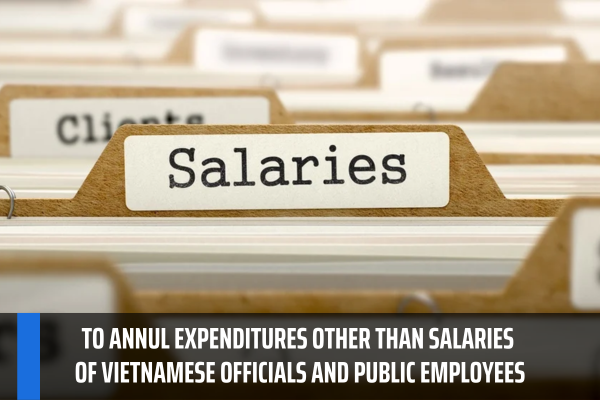From July 1, 2024: To annul expenditures other than salaries of Vietnamese officials and public employees according to Resolution 27?
From July 1, 2024: To annul expenditures other than salaries of Vietnamese officials and public employees according to Resolution 27?
“This is a reform, not a normal salary increase. If nothing changes, the time we can apply is from July 1, 2024." At the closing session of the Vietnam Socio-Economic Forum 2023 held in Hanoi on September 19, 2023, National Assembly Chairman Vuong Dinh Hue emphasized the early implementation of salary policy reform in 2024.
Accordingly, Resolution 27-NQ/TW in 2018 requires the need to drastically implement financial and budget solutions, considering this a breakthrough task to create resources for salary policy reform as follows:
- Drastically and effectively implement the Central resolutions on restructuring the economy associated with innovating the growth model; on perfecting socialist-oriented market economic institutions; on private economic development; on innovation and improving operational efficiency of state-owned enterprises; Resolution of the Politburo on restructuring the state budget and managing public debt to develop sustainable revenue sources and strengthen the leading role of the Central budget.
- Deploy the tasks of restructuring state budget revenues in the direction of ensuring total revenue sources and sustainable revenue structure. Amend, supplement, and complete revenue policies in the direction of expanding the tax base, including new revenue sources. Strengthen revenue management, create fundamental changes in preventing revenue loss, handling and preventing acts of smuggling, trade fraud, production and trading of counterfeit goods, transfer pricing, and tax evasion. Practice thrift, fight corruption and waste in using state budget and investing in basic construction. Drastically recover assets in corruption and economic cases.
- Every year, spend about 50% of the estimated revenue increase and 70% of the actual revenue increase of the local budget, about 40% of the central budget revenue increase for salary policy reform.
- Strengthen management and improve the efficiency of state budget spending; Continue to save 10% of the annual increase in regular expenditure estimates until the salary budget is implemented based on the payroll assigned by the competent authority.
- Sources for implementing salary policy reform remaining after ensuring the annual statutory pay rate adjustment and ensuring social security policies issued by the Central Government (for local budgets), projects Investment according to regulations (for localities with regulated rates) according to the resolution of the National Assembly must continue to be used to implement salary policy reform after 2020, not used for other purposes when permitted by competent authority.
- Annul expenditures other than salaries of officials and public employees originating from the state budget such as: Meeting allowances; Compensation for the development of legal documents and projects; seminar... Implementing salary budgets associated with the goal of streamlining payroll for agencies and units. Expand the funding mechanism linked to task performance results. Do not attach the salaries of officials and public employees to the development, amendment, and supplementation of documents regulating policies and regimes that are not of a salary nature. Research regulations on non-salary benefits (car, phone...). Only promulgate new policies and regimes when resources for implementation have been arranged and balanced.
- Accelerate the process of converting from fees to implementing public service prices, gradually calculating correctly and fully all costs for basic and essential services, and at the same time attaching appropriate support policies. suitable for the poor and policy beneficiaries. For public service prices that do not use the state budget, autonomy is given to service providers to decide on their own according to the principle of ensuring cost compensation and accumulation.
Public service units that are financially autonomous must ensure their own resources to implement salary policy reform. For public service units that ensure part of their regular expenses, continue to use at least 40% of the remaining revenue according to the regime (the health sector alone uses at least 35% after deducting the expenses included service prices), saving 10% of regular expenses on annual additional budget sources and arranging from assigned state budget estimates to ensure resources for implementing salary policy reform.
Public service units have no revenue source because the state budget ensures all regular expenses, saves 10% of regular expenses from the annual additional budget source and arranges from the state budget estimates assigned to implement salary policy reform.
Accordingly, if salary reform according to Resolution 27-NQ/TW in 2018 is implemented from July 1, 2024, expenditures other than salaries of officials and public employees originating from the state budget will be annulled.

From July 1, 2024: To annul expenditures other than salaries of Vietnamese officials and public employees according to Resolution 27?
What is the new salary structure for the public sector in Vietnam?
In Resolution 27-NQ/TW in 2018, it mentioned building a new salary structure for the public sector including:
Basic salary (accounting for about 70% of the total salary budget) and allowances (accounting for about 30% of the total salary budget). Additional bonus (bonus fund equals about 10% of the year's total salary fund, excluding allowances).
Vietnam: Will the statutory pay rate be annulled when implementing salary reform?
According to Resolution 27-NQ/TW in 2018, the content is as follows:
c) Identify specific factors to design a new payroll
- Annul the current statutory pay rate and salary coefficient, building the basic salary equal to a specific amount in the new salary table.
- Uniformly implement the labor contract regime according to the provisions of the Labor Code (or service provision contracts) for those doing executive and serving jobs (requires training level below intermediate level). ), the salaries of officials and public employees are not applicable to these subjects.
- Determine the lowest salary of officials and public employees in the public sector is the salary of people doing jobs requiring intermediate training level (level 1) which is not lower than the lowest salary of workers who have passed training in the corporate sector.
Thus, in the spirit of Resolution 27-NQ/TW in 2018, if salary reform is implemented, the statutory pay rate and salary coefficient will be annulled.
Instead, the basic salary will be built with a specific amount in the new salary schedule.
LawNet
